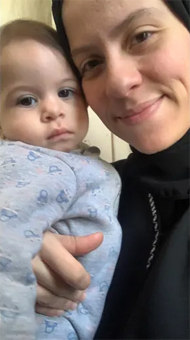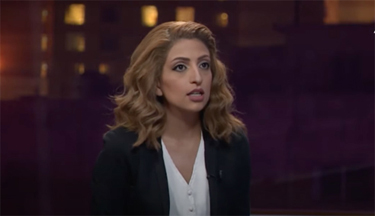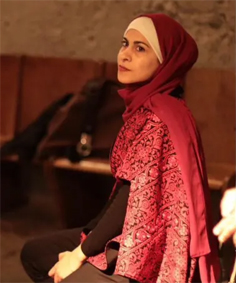|
CRY FREEDOM.net
formerly known as
Women's Liberation Front
MORE INSIGHT MORE LIFE
Welcome to cryfreedom.net,
formerly known as Womens
Liberation Front.
A website
that hopes to draw and keeps your attention for both the global 21th. century 3rd. feminist revolution as well
as especially for the Zan, Zendegi, Azadi uprising in Iran and the
struggles of our sisters in other parts of the Middle East. This online magazine
that started December 2019 will
be published every week. Thank you for your time and interest.
Gino d'Artali
indept investigative
journalist
radical feminist and women's rights activist
'WOMEN, LIFE, FREEDOM'
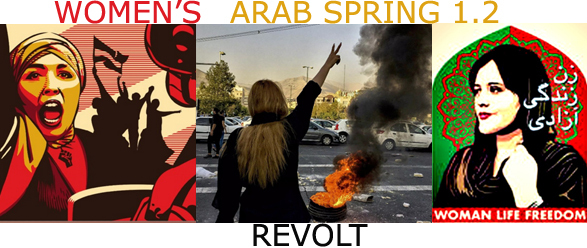
You are now at the section on what is happening in the rest of the Middle
east
(Updates
July 15, 2024)
Click here for the
Iran 'Woman, Life, Freedom' section
Updated July 12, 2024
For the 'Women's Arab Spring 1.2' Revolt
news
click here
Updated July 12, 2024
CLICK HERE ON HOW TO READ
ALL ON THIS PAGE
|
SPECIAL
REPORTS PALESTINE
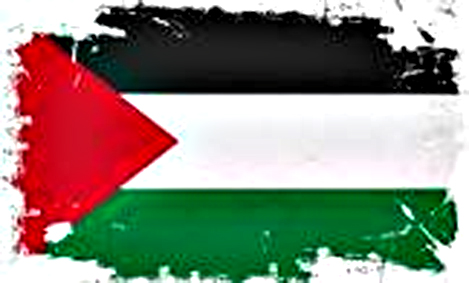
FROM THE RIVER TO THE SEA - FREE PALESTINE
July wk3 --
July wk2 P3
-- July
wk2 P2 -- July
wk2 --
July wk1 P3 --
Click here for an overview by week in 2024
|
|
July 13 - 11, 2024
"'critical lifeline'...
...Gaza 'is absolutely atrocious'...
...'safe zone' kills more than 70...
...Dozens of bodies recovered from rubble...
...Beatings, deprivation, torture, rape...
...Gazans mourn their loved ones killed...
...Death and rubble fill streets...
...and more news called 'genocide'
|
Click here to go throughout July
and earler, 2024 |
When one hurts or kills a women
one hurts or kills hummanity and is an antrocitie.
Gino d'Artali
and: My mother (1931-1997) always said to me <Mi
figlio, non esistono notizie <vecchie> perche puoi imparare qualcosa da
qualsiasi notizia.> Translated: <My son, there is no such thing as so
called 'old' news because you can learn something from any news.>
Gianna d'Artali.
BBC - July 12, 2024 - By Fergal Keane in Jerusalem, BBC News
<<Death and rubble fill streets of Tal Al-Sultan as rescuers dodge
Israeli fire
Rescue workers in Gaza say they often struggle to identify bodies. The
things they see. The dead girl lowered by a rope from a ruined building.
She sways slightly, then comes to rest, legs folding beneath her on the
rubble. They see people and parts of people lying out in the open where
the blast or the bullet caught them. Violent death in all of its
contortions. Bodies lying in the streets, in the blasted open sitting
rooms of houses, under the rubble. Sometimes covered by so much concrete
the men will never reach them, and only in the future when the war is
over will somebody come and give them a decent burial. The men of the
Gaza Civil Defence cannot close their eyes to any of this. There is no
shutting out the smell. Every sense is on alert. Death can come from the
skies in an instant. When the fighting in places like Shejaiya in
eastern Gaza City, or Tal Al-Sultan, near Rafah, in the south, is as
fierce as it has been in the last few days, the ambulances of the Civil
Defence dare not venture out. <Entering areas close to the Israeli
occupation is dangerous, but we try to intervene to save lives and
souls,> says Muhammed Al Mughayer, a local Civil Defence official.
He and his men seize any lull in the conflict to recover the dead and
the wounded. Families constantly ask about missing relatives. Muhammed
Al Mughayer, a Gaza Civil Defence official, says it can take days to
reach casualties. <It is very difficult to identify the bodies,>
explains Mr Mughayer. <Some remain unidentified due to complete
decomposition.> Stray animals also prey on the corpses, tearing off
clothes and scattering papers that might be used to identify them. The
ambulance crews are short of fuel. Two days ago one broke down in Tal
Al-Sultan and had to be towed out, a nerve-wracking experience for the
crews. The risk of being fired on by the Israeli forces, says Mr
Mughayer, means seriously injured people often cannot be rescued. <There
is currently a report of an injured person near Al-Salihin Mosque from
two days ago, but we can't reach them due to delays in coordination. It
may result in their death.> Refugees are continuing to flee from Gaza
city and areas like Shejaiya. Many have been displaced multiple times.
For them it is a world without laws or rules. World leaders express
concern. But nobody is coming to rescue them. Nothing is more acute for
these people than the sense that they can die at any moment.
'A slow death': Gazans live alongside rotting rubbish and rodents
Sharif Abu Shanab stands outside the ruins of his family home in
Shejaiya with an expression that is part bewilderment, part grief. <My
house had four floors, and I can't enter it,> he says. <I can't take
anything out of it, not even a can of tuna. We have nothing, no food or
drink. They bulldozed all the houses, and it is not our fault. Why do
they hold us accountable for the fault of others? What did we do? We are
citizens. Look at the destruction around you...<Where do we go, and to
whom? We are thrown in the streets now, we have no home or anything,
where do we go? There is only one solution and that is to hit us with a
nuclear bomb and relieve us of this life.> There are occasional glimpses
of reprieve. The Al-Fayoumi family, arriving close to Deir Al Balah in
central Gaza, were relieved to have escaped from Gaza City. This after a
warning this week to evacuate from the Israel Defense Forces sent
thousands of people onto the road south. In the boiling heat of the
asphalt road, without shade, family members were reunited with others
who had gone ahead of them. The new arrivals were given water and soft
drinks. A boy sucked from a carton of juice, then squeezed it with all
his strength to coax out a last few drops. Nobody in the group took
their survival for granted. So to see everyone alive, all in the one
place, brought smiles and cries of happiness. An aunt reached into a car
to hug her young niece. At first the child smiled. Then she turned her
head and sobbed. Where will they be tomorrow, next week, next month?
They have no way of knowing. It depends on where the fighting moves
next, on the next Israeli evacuation order, on the mediators and whether
Hamas and Israel can agree a ceasefire. These lines could have been
written at any time in the last few months. Civilians dying. Taking to
the roads. Hunger. Hospitals struggling. Talks about a ceasefire. Since
February, we have been following the story of Nawara al-Najjar whose
husband Abed-Alrahman was among more than 70 people killed when Israeli
forces launched an operation to rescue two hostages in Rafah. They had
fled Khan Younis 9km (6 miles) to the north, and took refuge closer to
Rafah when bullets and shrapnel tore through the tented camp where they
slept. Nawara was six months pregnant when she was widowed, and taking
care of six children, aged from four to 13. When a BBC colleague found
her again today, Nawara was nursing her newborn baby, Rahma, just one
month old.
She gave birth on a night of heavy airstrikes, rushed to the hospital by
her in-laws. <I kept saying: 'Where are you Abed-Alrahman? This is your
daughter coming into the world without a father.'> Baby Rahma has red
hair like her dead father. The Israeli advance into Rafah last month
sent Nawara and her children fleeing again, back to their old home in
Khan Younis. She struggled to settle there again. <My husband's things
were there, his laugh, his voice. I couldn't open the house. I tried to
be strong. Then I took my children and opened the door, and we wandered
around the house, but it was hard. I cried for my husband...He was the
one who cleaned the house, cooked for us, made sure I was comfortable.>
There has been fighting around Khan Younis again in the last week. An
Israeli air strike close to a school killed 29 people, local hospital
sources say, and wounded dozens more. But Nawara is adamant she will not
move again. Here she is close to the memory of the man she loves. She
imagines her husband as a still living presence. She sends texts to his
phone: <I complain to him, and I cry to him...I try to reassure myself,
telling myself that I need to be patient. I imagine he's the one telling
me.>
With additional reporting by Haneen Abdeen, Alice Doyard and Nik
Millard.>>
Source:
https://www.bbc.com/news/articles/cjjw6dz8w2eo
Sky News - July 11, 2024 - by Mark Stone | US correspondent
<<Girl, 4, with rare genetic disorder evacuated from Gaza - but suffers
huge seizure
Julia Abu Zeiter has finally been evacuated from the warzone - but her
parents were denied permission to leave the territory. A four-year-old
Gazan girl with an ultra-rare genetic disorder has finally been
evacuated from Gaza - but has since suffered a huge seizure in hospital
in the United Arab Emirates. Sky News has been following the plight of
Julia Abu Zeiter for two months. It has been a story of hope,
heartbreak, kindness and cruelty.
Now, the little girl is out of a warzone but in intensive care and
without her parents who were denied permission to leave Gaza. In May, we
revealed the intense efforts of a family in Washington whose own
daughter has the same rare condition called alternating hemiplegia of
childhood (AHC). We also reported how initially permission was denied
for Julia to leave Gaza to access life-saving treatment. Over the past
eight weeks, Simon and Nina Frost have worked day and night to raise
awareness of Julia's case. With remarkable determination, they brought
together a network of people - from governments and charities. Two weeks
ago, after multiple failed efforts, permission was obtained from the
Israeli and Egyptian authorities to grant her permission to leave Gaza
along with a few other children in urgent need of medical care. The
effort to evacuate Julia has been led by a US-based charity, the
Palestine Children's Relief Fund (PCRF). Speaking to Sky News, the head
of PCRF's Treatment Abroad Programme, Tareq Hailat, said: <Julia's
evacuation was one of my toughest but most rewarding experiences.> He
continued: <It took the combined efforts of many, including PCRF, the
AHC community, journalists, and members of the USA and UAE governments.
PCRF had to achieve the nearly impossible.> But for reasons that remain
unclear to the PCRF and all those involved in her evacuation, the
Israeli authorities denied permission for her parents, Amjad and Maha,
to leave. They remain stuck in Gaza with Julia's older sister. Maha Abu
Zeiter, mother of Julia, who has Alternating Hemiplegia of Childhood (AHC)
and is trapped in Gaza with her family. From Mark Stone report
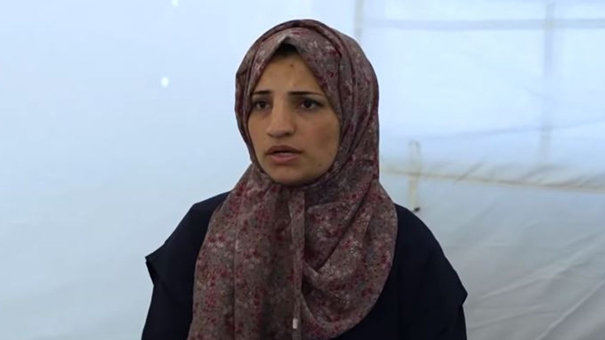
Maha Abu Zeiter - Julia's mother
At the eleventh hour, Julia's teenage aunt was granted permission to
travel with her to Egypt and then on a medical flight to Abu Dhabi. Mr
Hailat said: <Securing approval for her departure came at the very last
minute, just 30 minutes before the convoy's departure, after many
sleepless nights. It was an exhilarating moment, but also bittersweet,
knowing that thousands of other children deserve the same chance Julia
received.> In Abu Dhabi, Julia initially responded well to treatment and
to her new surroundings. But this week she suffered a massive seizure
which is not uncommon. AHC is sometimes called the <human timebomb
disease> given the tendency for it to trigger life-threatening seizures,
often brought on by stress.
Julia's father Amjad told Sky News that he and his wife are distraught.
Julia is recovering in the ICU after suffering a huge seizure
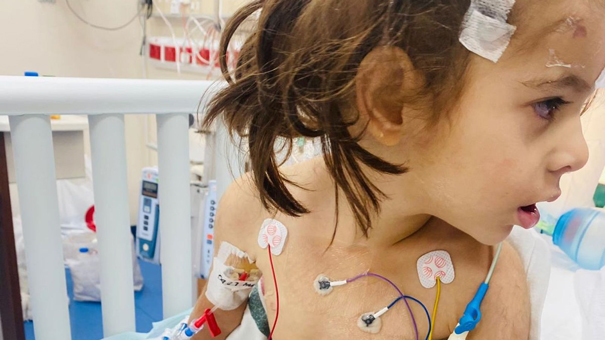
Julia is recovering
In a desperate exchange with Sky News via WhatsApp, Amjad said: <Our
heart is attached to Julia because she is far from us and we do not
sleep well because of thinking about her so much.> Amjad said: <Julia is
crying from pain, and when we watch a video of her crying, my wife cries
immediately. There are some videos that I delete because I do not want
my wife to watch them because it is so painful for her.> He added: <I
can conceal my feelings internally and endure a little, but my wife
cannot.> Amjad and Maha's other daughter is six years old and remains
with them in a tent in central Gaza. <My daughter Sham asks me, 'When
will we see Julia? This is my beloved sister. I miss her'.> <We all have
a heavy heart and think about her a lot. Is she well today? Did she eat
well? Did she take medication today?> The challenges are compounded
because the condition is so rare and many medical professionals do not
have experience treating it. Amjad worries too that Julia's aunt will
not be able to cope. He said: <Regardless that her aunt is with her, she
will not understand Julia's condition like we do. Four days ago, she
sent me a video of Julia, and she did not notice that Julia's right half
was not moving. Even the doctors did not notice.> Julia remains in the
intensive care unit at hospital in Abu Dhabi but is showing signs of
improvement. <Today, we spoke with Julia via video. She was waving her
hands at us, she cried when she saw us. She misses us and so do we,>
Amjad said. Amjad, Maha and Sham hope to leave Gaza soon to be reunited
with Julia. But the borders to Egypt remain closed and the war
continues. Speaking to Sky News, Mr Hailat said: <I want to emphasise
that this medical evacuation is a drop in the ocean. Thousands of other
kids are still in Gaza awaiting medical evacuation. The Rafah border
crossing must be immediately reopened to allow for the safe flow of
humanitarian aid and medical transfers.> >>
Source incl. videos:
https://news.sky.com/story/girl-4-with-rare-genetic-disorder-evacuated-from-gaza-but-suffers-huge-seizure-13176835
Al Jazeera - July 4, 2024 - By Dr Sandy Inglis
<<As explosions rattle our Gaza field hospital, we brace for the wounded
A Red Cross surgeon takes us inside a hospital's operations as staff
work to save patients following an attack.
A woman and a girl react following an Israeli strike that hit a tent
camp, amid the ongoing conflict between Israel and Hamas, in Al-Mawasi
area in western Rafah, in the southern Gaza Strip. The explosions are
the cue.
Boom. And again: Boom.
On June 21, in the coastal area of al-Mawasi, on the southern end of the
Gaza Strip, dozens of people were killed and scores injured when
hostilities reached a displacement camp near the premises of the
International Committee of the Red Cross (ICRC). Within minutes, the Red
Cross field hospital next door, where I work as the senior medical
officer, began receiving patients. That afternoon, I had been sitting in
the admin area of the hospital in a meeting about staffing and rosters
when we heard a particularly loud explosion. The wave of sound hit me.
The hospital's tent walls jerked as the shockwaves reverberated. We
quickly realised what would be coming, and most staff - local
Palestinians and foreigners - went to the emergency department to
prepare. But there was no time to prepare. In the chaos of war, you
adapt. I stood at the hospital entrance as ambulances came screeching
in, at times sliding to a stop, with paramedics piling out to grab the
stretcher, directing each patient to the appropriate area of our
hospital, categorised by colour. The red area: a young man with an arm
dangling by threads of skin from the shoulder, shrapnel wounds across
the chest and stomach. Immediate attention needed. Life at risk.
Amputation likely. The yellow area: a toddler screaming in pain, all
limbs attached but a clear fracture, bleeding from shallow cuts. X-ray
and splint required, maybe stitches. The black area: a corpse, burned so
badly as to be unrecognisable, wrapped in a sheet and sent to our
morgue. On this day, more than 50 wounded patients arrived at our field
hospital, and despite our best efforts, eight of them died after their
arrival. The bodies of 14 people, already dead, also were brought to us.
The doctors and nurses I work with arenít strangers to what we call mass
casualty events Ė critical situations that typically overwhelm the
standard equipment and staff levels. Sadly, that week, we had three such
events. When they happen, we focus on the job at hand - treating those
who need it. Inside hot tents, you analyse, you operate, you stitch. Not
far away are the gunshots and explosions, adding an element of fear for
patients who have already lived through horror. Those who are conscious
may be panicked or scared. Some are blank - in shock - or are yelling
for family. Some need to be sedated.
After helping one patient, it's on to the next bed. Assess, take
readings, set a cast. Then the next. All around you, family members are
screaming, people grieving, bystanders shouting. Staff, though clearly
traumatised, continue working. People view hospitals - even ones made of
canvas and tarpaulin - as havens of safety during war. Under
international humanitarian law, hospitals are protected locations, so
that those who need it can get medical attention and treatment. In a
place like Gaza, where no civilian feels safe, this creates a Catch-22
situation. People want to be close to the hospital, so they feel less
exposed. At the same time, we have limited space and are trying to
respond to large-scale emergencies where the lives of dozens are at
risk. Usually before a major influx of patients, you have time to gather
staff and assign roles, set up triage beds and mass casualty kits with
extra equipment, and give a quick situation update on whatís coming. But
that week, because the explosions were so close to the field hospital,
patients began arriving within six minutes. The injuries were like those
we have seen continually since the field hospital opened in mid-May
close to the city of Rafah, and which have been seen across the entire
Gaza Strip since October. Some can physically recover; some will live
without a limb. But the mental toll, particularly for children, is so
heavy it will remain for years to come. This is always a huge worry, and
one that stays with me. Some of those injured on June 21 will need more
surgeries. Many will need physiotherapy and mental health support to
recover. After the patients have been attended to, we clean up, we
repack the mass casualty boxes with fresh equipment, we speak to family
members, and we debrief. The staff are traumatised by all they have seen
but know the only thing they can do, for now, is attend to the patients
still in the hospital and get as much rest as they can - before the next
emergency.
SOURCE |incl. video|: AL JAZEERA>>
https://www.aljazeera.com/features/2024/7/4/as-explosions-rattle-our-gaza-field-hospital-we-brace-for-the-wounded
Women's
Liberation Front 2019/cryfreedom.net 2024


